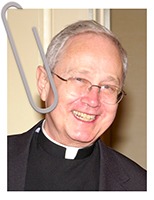Seeing Beyond Our Noses
“Thinking about yourself so much that you do not notice what is happening around you.” That’s the dictionary definition of not seeing beyond one’s nose. I don’t like to think of myself as not seeing beyond my nose. But the more read and reread Pope Francis’ latest book (er, I mean, encyclical) Fratelli Tutti, the more I realize how near-sighted I am.
My first hint about not seeing beyond my nose came when I read his chapter “A Stranger on the Road”. Now I have always loved that story. Yet when I reread Pope Francis’ second chapter “A Stranger on the Road”, I realized there were so many different ways of reading it.
For example, I had never thought of Jesus using that story to tell us of the Kingdome… God’s dream for us. Imagine a “kingdom” characterized by people who instinctively saw even a wounded enemy as a neighbor. Also, the ‘hated Samaritan” saw him not just conceptually but practically, to the point of interrupting his own life to care for him. In this chapter, Francis goes further. He shows us the contemporary dress of each of the characters in the story. Now I recognize I am each of them.
Going beyond…
I am now rereading Chapter 3 – Envisaging and Engendering an Open World. The word and the concept that keeps popping up there is “beyond”, another way of saying one is actually seeing beyond one’s nose.
All this got me thinking about going “beyond” my usual way of reading. Too often I read Scripture with my head. When I read from a safe distance. When I read with my heart I realize how dangerous this reading is. It becomes about me. This kind of dangerous reading sees something more than a story from the past. I hear the challenges to translate what I am reading… not to another spoken language but to a “lived language” that the Saint and Pope Francis’ know so well. “Preach always… and if you must use words”
As I read about envisaging an open world, I realize Pope Francis is telling me to look beyond the ways of the world today that obviously don’t work. His first chapter “Dark Clouds” lays this out very honestly what doesn’t work. Francis is calling the church as a community of individuals to grow beyond the limitations of our horizons as Jesus did. I am just starting to read “Envisaging and Engendering an Open World.”
I did not realize how timely Lent is with its call to “repent” or “change our way of thinking. Fratelli Tutti challenges me to see beyond the “Original Sin of our self-centeredness”.
As Pope Francis said in his Ash Wednesday homily
“Lent is a time to reconsider the path we are taking. Lent is a journey that involves our whole life… a humble descent both inwards and towards others.”
To be continued…
Pope Francis concludes with “A Prayer to the Creator”
Lord, Father of our human family,
you created all human beings equal in dignity:
pour forth into our hearts a fraternal spirit
and inspire in us a dream of renewed encounter,
dialogue, justice and peace.
Move us to create healthier societies
and a more dignified world,
a world without hunger, poverty, violence and war.
May our hearts be open
to all the peoples and nations of the earth.
May we recognize the goodness and beauty
that you have sown in each of us,
and thus forge bonds of unity, common projects,
and shared dreams. Amen.
Click below for an audio version of this Vincentian Mindwalk


Great reflection, Father John.
Great image of the compass – which always points to NO(rth). Got me to thinking that I might need to start “looking beyond my NO’s.” There are so many nudges I end up saying “No” to that might have made a difference in someone’s life (including my own).
So much to reflect on this Lent – I hope I find the time to get it all in.
“When I read with my heart I realize how dangerous this reading is. It becomes about me.”
Indeed, what “was written in the past was written to teach us, so that through the endurance taught in the Scriptures and the encouragement they provide we might have hope” (Rom 15, 4).
But, then, it is also true, as you also say, that we have to read and “grow beyond the limitations of our horizons,” to “see beyond the ‘Original Sin of our self-centeredness.’” And it seems to me that his means, first of all, we have to let Scriptures speak for themselves, allow them to convey their original and their fuller sense, too, without us reading into them our own pre-conceived meanings, our presuppositions.
Edmund Husserl, a philosophy mentor to St. Stein Edith (St. Teresa Benedicta of the Cross) urged that we “go back to the things themselves,” to strive for a presupposition-free philosophy.
In the first reading in today’s Office of Readings, Peter reads into the vision his own meaning, but then it is right away conveyed to him what God means.
In the second reading, St. Leo the Great touches on Peter’s confession and the ensuing primacy that is given him. Different people have read different ideas into such primacy, ideas that have lead to the Church and its structure being what they are as we know them today.
The developments are not necessarily bad, as Raymond E. Brown already said in his Priests and Bishops. Even St. Vincent points out that the disappearance of deaconesses during Charlemagne’ time may well be a disposition of Providence.
In my view, developments are good or bad depending on whether they foster or hinder a better understanding and more effective carrying out of authority in the Church as service even to the point of a servant laying down his life for the served.